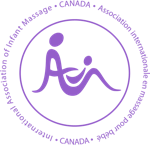Benefits of Infant Massage with IAIM
Infant Massage is a traditional parenting practice in India and many other parts of the world, where generations of mothers offer nurturing touch to their babies. It provides a loving connection between parent and baby starting early in life, strengthening this attachment as baby grows. Today, countless research studies in the US and in Europe support the benefits of infant massage with impressive results. Babies are able to relax and sleep better, they calm themselves more readily, and they thrive on many measures of infant health and development.

Benefits for Babies and Children
- Provides a special individual time for communication that builds love and respect
- Promotes attachment and bonding by providing skin to skin touch and a nurturing experience between parent and infant
- Helps baby to feel heard, acknowledged and loved, building their self-esteem
- Helps baby to sleep longer and more deeply
- Increases baby’s body awareness
- Massage stimulates all body systems
- Helps relieve discomfort from gas, constipation, colic, teething, and congestion
- Helps to stimulate circulation
- Aids digestion and gastrointestinal system
- Helps baby to relax and let go of emotional stress
- Improves sensory awareness
- The sensory stimulation of touch promotes growth and development by supporting myelination of the brain and nervous system
- Can be adapted to benefit baby with special needs

Benefits for Parents and Caregivers
- Relaxing, pleasurable one-to-one time with baby
- A great way to connect and get to know baby
- Helps parents to feel more confident in handling their baby
- Helps parents to understand and interpret baby’s cues and cries
- Provides a positive way for fathers and other family members to be involved in nurturing baby
- Helps parents to develop their nurturing skills by learning to listen and respond to baby
- Helps to alleviate stress and develop strong family bonds for working parents who are separated from their children during the day
- Can help to alleviate postpartum depression in mothers
